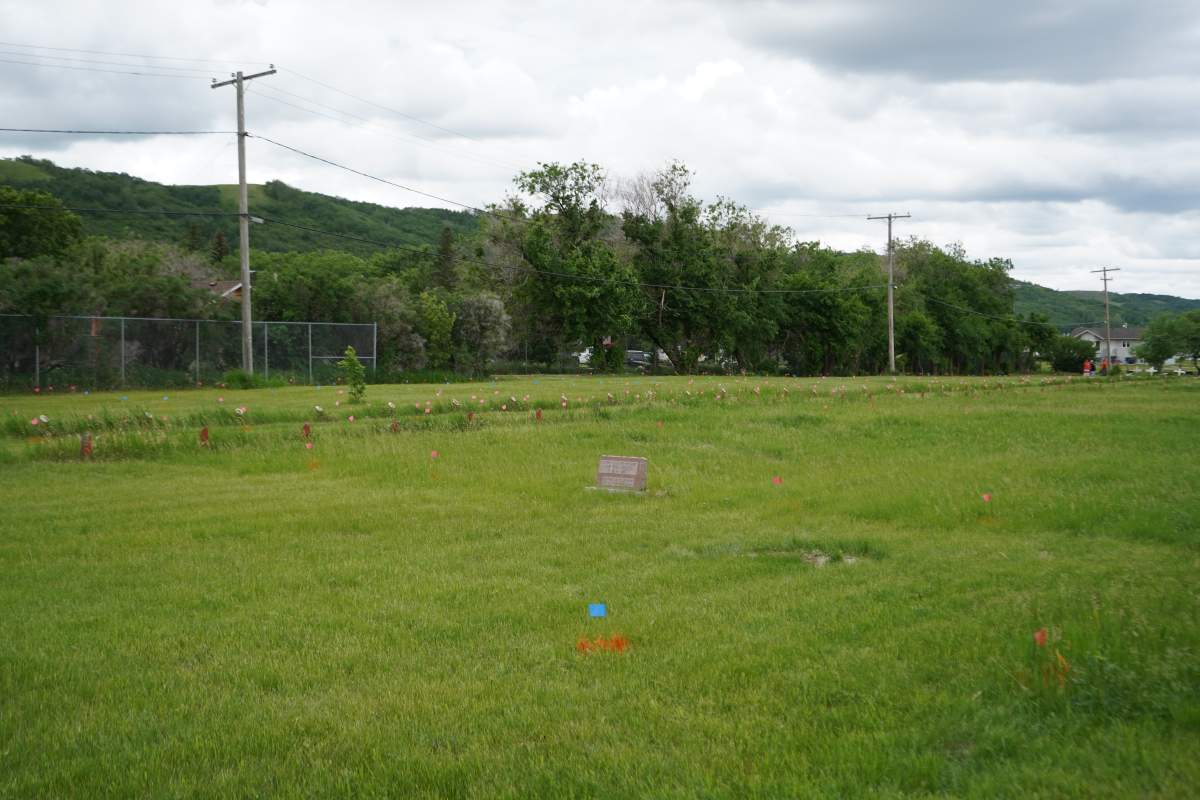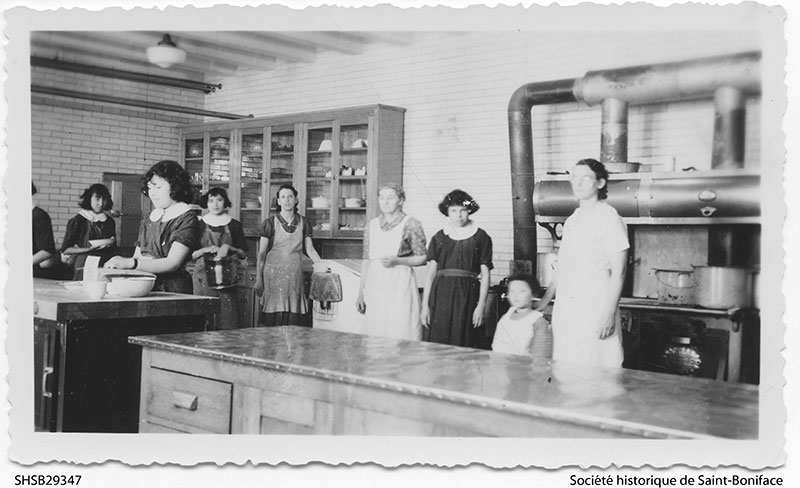An estimated 751 unmarked graves were found at the site of the former Marieval residential school, the Federation of Sovereign Indigenous Nations (FSIN) and Cowessess First Nation in Saskatchewan said Thursday.

The announcement was made at a virtual press conference by FSIN chief Bobby Cameron and Cowessess First Nation Chief Cadmus Delorme and comes weeks after 215 unmarked burial sites were reported at a residential school in Kamloops.

Chief Delorme said they cannot confirm all the unmarked graves contain children. There are oral stories of adults being buried there as well. The residential school gravesite was run by the Roman Catholic church.
“We did not remove these headstones. Removing headstones is a crime in this country,” Delorme said.
“We are treating this as a crime scene at the moment, and we’ll know more as continue our search,” Delorme added.
Delorme added that this is not a mass grave site, instead calling the discoveries unmarked graves.
“In the 1960s, the Catholic Church removed the headstones and today, we have over 600 unmarked graves,” Delorme said.

Delorme explained that the gravesite was first started in 1886 when the Roman Catholic church came to the community.
The land is referred to as the community gravesite after the 1970s when the Roman Catholic Church and the archdiocese ceased operations of the residential school.
Marieval Indian Residential School operated between 1899 and 1997.
Delorme clarified that the school opened in 1898 and was closed in 1996.
According to oral stories, Delorme said children from some areas in southwestern Manitoba went to the school.
Children in south central Saskatchewan also went to Marieval, but Delorme said a majority of the children were from Treaty 4 territory which spans southern Saskatchewan.
Treaty One Nation in Manitoba sent their condolences to the Cowessess First Nation community.
“The Treaty One Nation is saddened to learn that more children’s bodies were found on the grounds of the former Marieval IRS – the largest gravesite discovery to date,” said spokesperson Chief Dennis Meeches.
One Knowledge Keeper from Cowessess First Nation also spoke at the press conference about her experience at Marieval.

Florence Sparvier, 80, said nuns at the school were “very mean to us.”
“We had to learn how to be a Roman Catholic. We couldn’t say our own little blessings the way we said it at home. We had our own way of honouring ourselves and Mother Earth in our homes when we were little, but we had to leave that all after,” Sparvier said.
Sparvier added at home, she was taught how to look after herself physically, mentally and spiritually but that was all stripped away when she went to residential school.
“They told us what to say. They told us about a new being that was supposed to be our ultimate saviour. But the ones we had in our school, they were not nice either. They were very condemning about our people.”
Sparvier said children were told their family members didn’t have a way to be spiritual because “they were all heathens.”

Get daily National news
Search of unmarked graves in beginning stage
The search for unmarked graves on Cowessess First Nation is just in phase one, Delorme explained in the press conference.
Cowessess First Nation had begun the process on June 2 with the help of Saskatchewan Polytechnic, which used ground-penetrating radar technology. As of Wednesday, a total of 751 “hits” were found using the tech, which has a 10 to 15 error percentage.
Phase one of the process has covered 44,000 square metres.
“We can’t confirm if there is more than one (body) under that hit,” Delorme said.
In some cases, graves are one metre by one metre apart.
“We want to make sure when we tell our story that we’re not trying to make numbers sound bigger than they are.”
Delorme added that the technical team will be assessing the hits and a verified number should be available in the coming weeks.

As the cemetery was run by the Roman Catholic church, Delorme said there is a possibility that some people buried at the site may have attended the church and lived in local surrounding towns.
The community plans to put names to these unmarked graves.
“We want to honour our loved ones that lay here today. We want to make sure that we keep that place and preserve it, so many could come here and heal.”
Currently, flags mark all 751 graves.
Delorme explained that there was a “strong Catholic belief” at one time that if someone wasn’t baptized, or too young to be baptized, they could not be buried in the church’s cemetery.
Included in the search of phase one were sites of where non-baptized individuals may have been buried. In phase two, other locations on the First Nation will be searched that are presumed grave sites identified by community members.
Archbishop of Regina, Don Bolen, sent a letter to Delorme on Thursday apologizing for the “failures and sins” of Church leaders and staff.
“I know that apologies seem a very small step as the weight of past suffering comes into greater light, but I extend that apology again, and pledge to do what we can to turn that apology into meaningful concrete acts,” Bolen said.
Bolen added that archdiocese will help with accessing information to help come up with names and information about those buried in the unmarked graves.
FSIN Chief Cameron thanked Cowessess First Nation for the “challenging work” they completed by searching the site.
Cameron spoke out against residential schools, the ‘60s Scoop, day schools and the child welfare system.
“There has to be and must be immediate change, where our First Nation children come home to our communities and be raised in communities amongst our own language and culture experts.

“This was a crime against humanity. An assault on First Nation people. We are proud people.
“The only crime we ever committed as children was being born Indigenous.”
Cameron said many other communities will be searching other former residential school sites and more graves will be found.
“We will find more bodies and we will not stop until we find all of our children. We will do a search of every Indian residential school site and we won’t stop there. We will also search all of the sanitariums, Indian hospitals and all of the sites where people were taken and abused, tortured, neglected and murdered.”
Cameron said the FSIN is calling on the Canadian government and Catholic church to hand over records to help communities identify buried children and cause of death.
“We try to put ourselves in the eyes and the bodies of these children who are now being found in the ground who have been waiting for decades to have a proper burial and to be honoured properly amongst our own protocols, traditions and customs, and a small First Nations voice said, ‘They found us, they found us.”
According to the National Centre for Truth and Reconciliation records, the school was constructed by Roman Catholic missionaries. The federal government started funding the school in 1901.
The national centre’s public records list eight student deaths.

Cowessess First Nation had begun the process of locating unmarked graves on June 2 with the help of Saskatchewan Polytechnic using ground-penetrating radar technology.
Members of the media were asked not to visit the school or community site due to COVID-19 safety restrictions in place.
According to the Truth and Reconciliation Commision of Canada, more than 150,000 Indigenous children were placed in residential schools.
In late May, a First Nation in Kamloops, B.C., reported that unmarked burial sites of 215 children were found on the site of the former Kamloops Residential School.

Since then, First Nations across the country have begun the process of searching for gravesites in their own communities and calling on their local governments as well as the federal government to help.
Among the Truth and Reconciliation Commision of Canada’s calls to action are items specifically related to residential school burials.
Item 71 calls on chief coroners and provincial vital statistics agencies to provide records on the deaths of Indigenous children who went to residential schools.

Another item calls upon the federal government to work with churches and Indigenous communities to form and maintain an online registry of residential school cemeteries and if possible, plot maps showing the location of deceased residential school children.
The Trudeau government has promised to implement all 94 calls of action. So far, only one out of six regarding missing children and burials has been completed — the student memorial register.
The federal government committed to providing the FSIN with $4.88 million in funding for residential school searching efforts, while the Saskatchewan government has provided the FSIN with $2 million for research into undocumented residential school deaths.
Angela Mashford-Pringle, a professor at the University of Toronto’s Dalla Lana School of Public Health, told Global News that she’s hoping for this to be the start of a discussion that was never had after the Truth and Reconciliation Commission.
“We’re actually moving to a point where Canadians are going ‘hey, I didn’t recognize how big a problem this is and let’s have a discussion so that we can move towards healing,’ because right now we’re not near healing if we can’t even talk about the truth of the genocide that’s happened in Canada,” she said.
—With files from David Giles, Roberta Bell and Saba Aziz
—
Anyone experiencing pain or distress as a result of their residential school experience can access the 24-hour, toll-free and confidential National Indian Residential School Crisis Line at 1-866-925-4419
An additional crisis line has been set up for local community members in light of this news, and can be reached at 306-522-7494.









Comments
Comments closed.
Due to the sensitive and/or legal subject matter of some of the content on globalnews.ca, we reserve the ability to disable comments from time to time.
Please see our Commenting Policy for more.